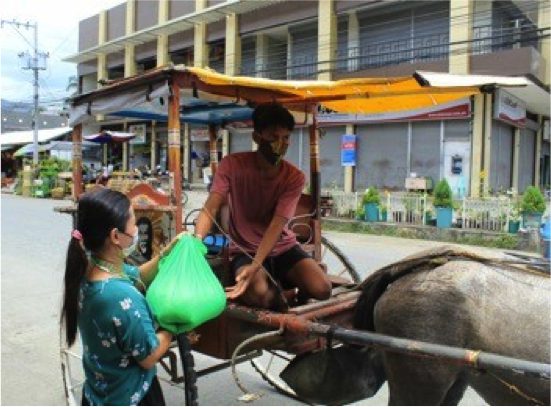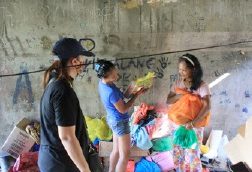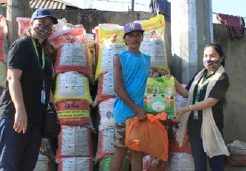Iligan City is one of the few remaining localities in the country and the only one in Mindanao that allows kalesa as a means of public transport.
Locally knownas tartanilya, the horse-drawn carriage, serving a specific route, was introduced by the Spaniards in the Philippines during the 18th century. As the local government extended the enhanced community quarantine (ECQ) in Iligan to contain the spread of the new coronavirus, the city’s corps of tartanilya remains grounded.
Erick, a kutsero (tartanilya operator) and father of five, finds life quite hard at these times. With his tartanilya grounded due to the lockdown, he has no income to support his family whose youngest member is just a year old.
Other daily wage earners in the city also have a similar experience of the ECQ as Erick. Nila and her family are the typical informal settlers.


With thin plywood as bed, they are sleeping under the thick cemented bridge of Tubod village.
They share the space with many other families. Are their names listed as beneficiaries of the assistance programs of the government agencies like the DOLE, DSWD, and even PSA? That we don’t know.
Another person whose life in the ECQ makes hard is Lito. For more than a decade now, he sells unwashed sand dug from Tubod River.
The proceeds from daily sales mean food on the table and baon for his kid to school. But with the ECQ for more than a month now, Lito finds his family’s plates sometimes empty.

Sidewalk vendors who solely rely on daily meager sales for their family’s essential needs like Jorge, a face masks vendor.
He shared that it is better to wash one’s hand when one has something to eat than always washing the hands with an empty stomach.
The worst thing that a father could experience is when his family would die of hunger than dying of coronavirus.
If ever that would happen to him, then it will be a loss of his dignity as a father.
Their stories are our context.
In partnership with VSO Philippines, Project PeaceConnect of The Asia Foundation, Nonviolent Peaceforce -‐ Lanao Field Team, and the 2nd Mechanized Brigade of the Philippine Army, Pakigdait launched the “Pakigdait Batok Sa COVID-19” using a conflict transformation approach in providing humanitarian relief to those heavily affected by the community quarantine measures.
Pakigdait is a local partner of the global network of the United Religions Initiative (URI) and a regional partner of the South East Asian Network of Civil Society Organizations (SEAN- CSO).
Pakigdait believes that the lens of interfaith peacebuilding is highly relevant in this period of the pandemic as the health crisis resurrected in the deep-seated cultural and religion‐based biases and prejudices among many residents of Iligan city where cases of discrimination were also on the news.
The scarcity of food and lack of social services can trigger resource-based conflict, which can exacerbate existing vertical conflicts in communities that are mired in rido (clan conflict).
The distribution of food relief, if done without regard to a do-no‐harm lens, could further marginalize vulnerable families especially Meranao traders and Bisaya daily wage earners.


Pakigdait’s house-to-house distribution is just the series of non‐discriminatory care‐provision targeting 250 vulnerable families of Iligan City and Lanao del Norte. The aid bundles include three varieties:
(a) food items such rice, dried fish, canned goods and noodles;
(b) health care goods such as five face masks sewed by mothers of former Moro combatant from Delabayan in Kauswagan town, alcohol and soap; and
(c) Big‐Faith (Bio-‐Intensive Gardening Food Always In The Home) packs such as veggie seeds, garden tools, and pots.
Part of the distribution is the brief understanding sharing on COVID19 prevention and distribution of printed info-‐materials translated in Bisaya and Meranao. (Pakigdait Inc)

